Protesters Trek 20 Miles to Prevent Deportation
February 8, 2014

Nearly a hundred protesters stood in solidarity on the morning of Ricardo Ramos’s scheduled deportation, a day that also marked his daughter’s 12th birthday.
On the morning of Jan. 16, protesters gathered to begin a 20-mile march from the Great Lakes Mall to St. Casimir Catholic Church in Cleveland in an attempt to prevent the deportation of Ramos, an Ohio resident for nearly 16 years.
Veronica Dahlberg has worked closely with Ramos, his wife and three children as executive director of HOLA, grassroots organization that focuses on Latino outreach, advocacy and community organizing. The organization has dealt with family separation issues in Ohio for the past four years.
“We had close to 100 people walking in the bitter cold. It was raining in some parts of the walk, and it was a very grueling journey,” said Dahlberg. “But it was to raise awareness of the plight of this family risking separation.”
But it took more than a 20-mile march to prevent Ramos’s deportation. Attorney David Leopold took on the family’s case pro bono and filed a motion that temporarily halted the deportation, allowing Ramos to celebrate his daughter’s birthday.
“Ricardo and his family are not feeling a real sense of security, but they are deeply grateful for all of the support they have received,” Dahlberg said. “They love this country, the people and the church.”
According to Dahlberg, the march’s conclusion at St. Casimir Church is of symbolic importance.
“St. Casimir Church has a long history of miracles. The church was supposed to be torn down years ago, but the people of the church met every Sunday for three years and managed to keep it open. They brought that same fighting spirit to Ricardo’s case,” Dahlberg said.
In addition to the support of Leopold and the church, veteran Joseph Meissner contributed to the efforts.
“[Meissner] has been writing letters to members of Congress, and he got an award for Veteran of the Year. He is a graduate of Harvard Law and he has dedicated his life to helping Vietnamese immigrants. It is a blessing to have his support,” said Dahlberg.
While many praise the efforts that delayed Ramos’s deportation, some voice that there is more to be done.
“It is important to show solidarity through actions,” said College junior and immigration activist, Joelle Lingat. “We shouldn’t just talk about politics and write letters, but we need to show our support and have an active approach towards solidarity. On institutional and personal levels.”
Lingat became interested in issues of immigration and social justice when she took a U.S. history class her first year. Her research project, funded by a grant from the Andrew W. Mellon Foundation, also dealt with issues in immigration.
“I research and talk a lot about immigration because I come from a big immigrant community,” she said. “I think everyone has been saying that the immigrant system is broken and it’s hard for me to grapple with the fact that families are being broken up by man-made borders.”
Education systems across the country are coming face to face with issues of immigration.
The College is in the process of creating an undocumented students program that Lingat is a part of organizing.
“I think in general the system of higher education definitely privileges certain kinds of people, whether it be race, class or gender. I think it’s important to localize higher education so we don’t have too many people from the Coasts going to a Midwest rural school,” said Lingat. “We as a community need to go beyond just thinking and talking about it and start reflecting on what role we have as students, faculty, staff and as an institution.”
















